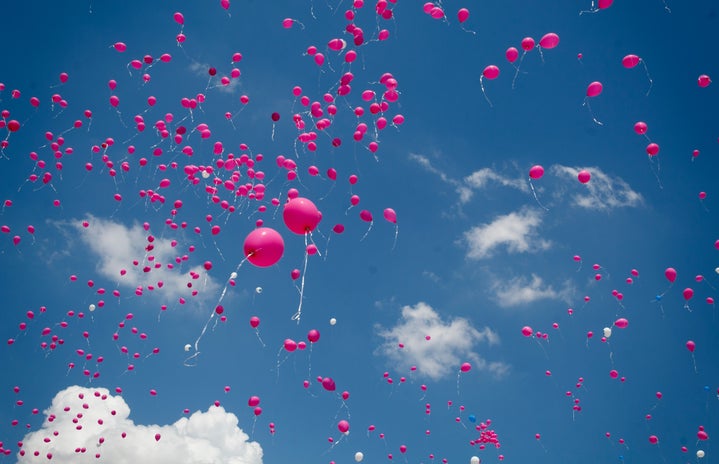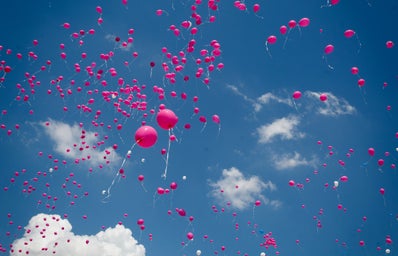Dedicated to my mother and every strong survivor of breast cancer.
In today’s day and age, women are constantly dealing with hurdles to overcome. Reproductive rights are being taken away left and right, having to work harder to be seen anywhere near the same level as men, being seen as ‘too difficult,’ and much more.
As if those didn’t make being a woman intimidating enough, women’s health across the United States is facing new concerns and alarming rises in rates for dangerous health conditions. In light of October being Breast Cancer Awareness Month, I want to bring to your attention what women around the country should be doing to keep themselves safe and aware of this condition.
When we think of cancer, we think of the end of the world. I know this because I lived it this summer. With a less than gracious phone call following an MRI, my mother was told that she had a Category 4C linear non-mass enhancement with a high chance of malignancy that needed further investigation. That was it: no explanations of what a ‘linear non-mass enhancement’ was, no consolation. Only a scheduled biopsy appointment three weeks away from those dreadful words being spoken. It set us on edge and had our anxiety in bundles of nerves because to anyone without real medical knowledge, ‘4C’ and ‘high chance of malignancy’ sounds like the end of the road.
Not only did it speak volumes about the lack of empathy and consideration in the medical industry, it was what sent me down the rabbit hole of medical terminology and research. If I didn’t look into this myself, who would be there for her? Fortunately, after further investigation, my mother has come out the other end of this with her fears nearly settled. However, not all women have the luck or opportunity to feel that way. Some find out that they have breast cancer too late, and others can’t afford the expensive treatments needed to take care of this life-threatening disease.
So, what should the women of America be doing to try and prevent such devastation? First, know your likelihood; according to the CDC, about 5% to 10% of breast cancers and 10% to 15% of ovarian cancers are hereditary. There are two genes majorly involved in combating these cancers: BRCA1 and BRCA2. When these two genes are genetically mutated, the risk of developing breast or ovarian cancer rises.
As advised by the National Cancer Institute, anyone who is concerned they may have inherited a harmful change in the BRCA1 or BRCA2 gene should discuss their concerns with their healthcare provider or a genetic counselor. This way, they can see if testing for an inherited change or germline genetic testing may be right for them.
Not everyone has access to the information or the necessary resources to know their family or genetic history, so the next step should be to keep up with examinations. Self-examinations are a good place to start since knowing how your breasts normally look and feel will help you identify anything unusual or abnormal, as suggested by the National Breast Cancer Foundation.
Additionally, the U.S. Preventive Services Task Force announced earlier this year the recommended age for women to start having mammograms completed has dropped to 40. This is a drastic drop from the previously recommended age of 50. They explained this by noting incidences have gradually increased among women aged 40 to 49 years from 2000 to 2015, increasing more noticeably from 2015 to 2019, with a 2% average annual increase. With all this in mind, you can see where the emphasis on breast self-awareness hits home.
Younger readers should not put off their concerns. According to the Breast Cancer Research Foundation, rates of metastatic breast cancer, cancer initially located in the breast that spreads to other areas of the body, in women under 40 have risen 3.5% each year between 2004 and 2017. By knowing the signs now, young women can keep their eyes peeled for anything that feels abnormal or unusual. After all, nobody knows our body’s gut feelings better than ourselves.
Now, I understand this can sound intimidating. Most young women don’t have the confidence to bring up such major concerns to their health providers. Even if they do muster the courage, the health care system might try to silence their voices and brush it off as them being ‘paranoid.’ I urge you to advocate for one another if you or your friends feel silenced. Accompany one another to appointments and stand up for your friends and family. This isn’t something to be ignored or handled alone.
If this information overload wasn’t concerning enough, women of color need to be especially cautious and aware of their health. The Preventive Services Task Force noted Black women have the second highest incidence rate of breast cancer. They are more likely to be diagnosed with breast cancer beyond stage I and are more likely to be diagnosed with triple-negative cancers. This means the cancer cells don’t have estrogen or progesterone receptors and make little to none of the protein called HER2, as explained by the American Cancer Society. Black women are approximately 40% more likely to die of breast cancer compared with White women.
Research from the Journal of Clinical Oncology has suggested all of these issues are tragically due to the larger issue of structural and systemic racism at hand. Black patients with cancer report they experience overt and unintentional racism, racial microaggressions, poor communication, and insensitivity to their concerns. Moreover, many providers are unwilling to offer all possible cancer care options under the assumption patients cannot afford them. This not only suggests women of color have to continue to stand up for themselves, as they always have, but that our fellow women with more privilege in the health system should stand with them. Breast cancer is not something only one demographic struggles with; it is a threat to all women.
The challenges women face regarding health, especially in the context of breast cancer, bring to light a pressing need for awareness, advocacy, and equitable access to care. As we acknowledge Breast Cancer Awareness Month, it is crucial to emphasize the need for awareness and empowerment. Proper knowledge and resources can be a pivotal step in combating this disease. By fostering support, advocacy, and education, we can work towards a future where all women have the tools and opportunities needed to fight against breast cancer, ensuring no one faces this battle alone.



